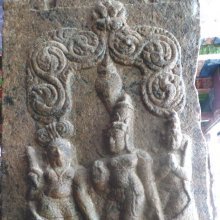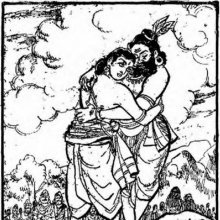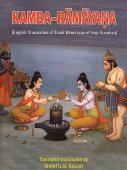Guha, Guhā, Gūhā: 39 definitions
Introduction:
Guha means something in Buddhism, Pali, Hinduism, Sanskrit, Jainism, Prakrit, the history of ancient India, Marathi, Hindi, biology. If you want to know the exact meaning, history, etymology or English translation of this term then check out the descriptions on this page. Add your comment or reference to a book if you want to contribute to this summary article.
Guha has 38 English definitions available.
Images (photo gallery)
(+5 more images available)
Languages of India and abroad
Sanskrit dictionary
[Deutsch Wörterbuch]
Source: Cologne Digital Sanskrit Dictionaries: Böhtlingk and Roth Grosses Petersburger WörterbuchGuha (गुह):—gaṇa aśmādi zu [Pāṇini’s acht Bücher 4, 2, 80.] m.
1) ein Beiname Skanda's, des Kriegsgottes, [Amarakoṣa 1, 1, 1, 35.] [Hemacandra’s Abhidhānacintāmaṇi 209.] [Anekārthasaṃgraha 2, 598.] [Medinīkoṣa Hemacandra’s Abhidhānacintāmaṇi 4.] guhāvāsādguho bhavat [Mahābhārata 13, 4099. 3, 7036. 14317. 14376. 14430. 14637. 9, 2663.] [Harivaṃśa 10478.] [Suśruta 2, 386, 6. 394, 1. 6. 15.] [Kumārasaṃbhava 5, 14.] [Rājataraṅgiṇī 1. 29.] [Bhāgavatapurāṇa 5, 20, 19.] [Devīmāhātmya 8, 12.] guhaṣaṣṭhī der 6te Tag in der 1sten Hälfte des Mārgaśīrṣa [Asiatick Researches III, 268.] —
2) ein Beiname Śiva’s [Mahābhārata 13, 1263.] [Śivanāmasahasra] —
3) ein Beiname Viṣṇu’s [Śabdakalpadruma] [Wilson’s Wörterbuch] —
4) Nomen proprium eines Königs der Niṣāda, eines Freundes des Rāma, [Rāmāyaṇa 1, 1. 29. 2, 50, 18. 6, 108, 44.] [MAHĀVĪRAC. 72, 7.] [Lassen’s Indische Alterthumskunde I, 130, Nalopākhyāna 2.] —
5) pl. Nomen proprium eines Volkes im Süden von Indien [Mahābhārata 12, 7559.] [Viṣṇupurāṇa 480.] —
6) ein in der Schreiberkaste beliebter Name [Śabdakalpadruma] [Wilson’s Wörterbuch] —
7) Pferd [Śabdaratnāvalī im Śabdakalpadruma] ein schnelles Pferd [Wilson’s Wörterbuch] — Vgl. kākaguha; guhā s. bes.
--- OR ---
Guhā (गुहा):—
--- OR ---
Guhā (गुहा):—
--- OR ---
Guha (गुह):—
1) vaktrāṇi Bez. der Zahl sechs [Weber’s Indische Studien 8, 383, 1.] guhakāni (ka Kopf) desgl. [396, 23.]
--- OR ---
Guhā (गुहा):—1.
1) ātmānamanviccha guhāṃ (das Herz) praviṣṭam [Spr. 3930.] — Vgl. mahāguha .
Source: Cologne Digital Sanskrit Dictionaries: Sanskrit-Wörterbuch in kürzerer FassungGuha (गुह):——
1) m. — a) Beiname — α) des Kriegsgottes Skanda. — β) Śva's. — γ) *Viṣṇu's. — b) Nomen proprium — α) eines Fürsten der Nichsāda. — β) Pl. eines Volkes. — γ) von Schreibern. — c) *Pferd oder *ein schnelles Pferd. —
2) f. guhā — a) Versteck , Höhle ; bildlich so v.a. das verborgene Herz. Am Ende eines adj. Comp. f. ā [Hemādri’s Caturvargacintāmaṇi 1,478,11.695,12.] Instr. guhā im Versteck , — Verborgenen , geheim ; insbesondere in Verbindung mit dhā , nidhā und kar verbergen , verstecken , verhüllen , beseitigen. — b) Hemionitis cordifolia. — c) *Desmodium gangeticum.
Sanskrit, also spelled संस्कृतम् (saṃskṛtam), is an ancient language of India commonly seen as the grandmother of the Indo-European language family (even English!). Closely allied with Prakrit and Pali, Sanskrit is more exhaustive in both grammar and terms and has the most extensive collection of literature in the world, greatly surpassing its sister-languages Greek and Latin.
See also (Relevant definitions)
Starts with (+49): Guha-vihara, Guhacandra, Guhacara, Guhachandra, Guhachara, Guhadavadya, Guhadeva, Guhadevasvamin, Guhadhipati, Guhadhvani, Guhagahanavant, Guhagahanavat, Guhagari, Guhagriha, Guhagupta, Guhahata, Guhahita, Guhajanman, Guhaka, Guhakaram.
Ends with (+51): Adriguha, Aguha, Atiguha, Bahuguha, Beragaguha, Bhumiguha, Brihadguha, Candraguha, Eraguha, Eramguha, Galaguha, Giriguha, Gopala bhatta guha, Hareyaboguha, Hemaguha, Indasalaguha, Indrasalaguha, Indrashailaguha, Indrasilaguha, Ishuguha.
Full-text (+252): Atiguha, Guh, Guhashaya, Giriguha, Guhamukha, Guhahita, Mahaguha, Guharaja, Guhagriha, Guhacandra, Guhadeva, Guhacara, Grahavarman, Guhagupta, Guhasena, Guhashiva, Guhara, Guhaka, Guhashashthi, Bhumiguha.
Relevant text
Search found 85 books and stories containing Guha, Guhā, Gūhā, Gūha; (plurals include: Guhas, Guhās, Gūhās, Gūhas). You can also click to the full overview containing English textual excerpts. Below are direct links for the most relevant articles:
Rig Veda (translation and commentary) (by H. H. Wilson)
Garga Samhita (English) (by Danavir Goswami)
Verse 6.8.5 < [Chapter 8 - The Marriages of All the Queens]
Verses 3.7.29-30 < [Chapter 7 - The Holy Places of Śrī Girirāja]
Verse 6.2.35 < [Chapter 2 - Residence in Śrī Dvārakā]
Katha Upanishad with Shankara’s Commentary (by S. Sitarama Sastri)
Verse 1.3.1 < [Adyaya I, Valli III - The parable of the chariot]
Verse 2.1.7 < [Adyaya II, Valli I - The nature of Atman and its importance]
Verse 2.1.6 < [Adyaya II, Valli I - The nature of Atman and its importance]
Kathopanishad (Madhva commentary) (by Srisa Chandra Vasu)
Vastu-shastra (5): Temple Architecture (by D. N. Shukla)
Guhārāja Cave-Temples < [Chapter 12 - History of Hindu Temples (Prāsādas and Vimānas)]
Guhādharas (Buddhist rock-cut architecture) < [Chapter 12 - History of Hindu Temples (Prāsādas and Vimānas)]
Layanas—Early Mauryan Specimens < [Chapter 12 - History of Hindu Temples (Prāsādas and Vimānas)]
Brahma Sutras (Shankara Bhashya) (by Swami Vireshwarananda)
Chapter I, Section II, Adhikarana III < [Section II]
Related products









